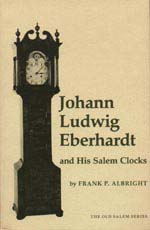Review by THOMAS J. SPITTLER New Carlisle, Ohio Published in 1978 and unavailable for the past 10 years, cache of 1,000 copies of Johann Ludwig Eberhardt and His Salem Clocks by Frank P. Albright have recently come to light. This is an
excellent book for anyone with an interest in tall case
clocks, North Carolina antiques, or American horological
history of the first half of the last century. When reading
this book one has to remember that the author wrote it in
the mid-1970’s when much of the information we now have
about white painted dials was not available. In fact the
author states that he is not aware of how to date the clocks
from the features on the dials. Nevertheless, the author
does an excellent job and his attribution of dates to 35 of
Eberhardt’s clocks are nearly flaw-less. The author also
does an excellent job in describing how a clockmaker
functions in the first half of the 1800’s. What parts did
the “maker” purchase from parts houses in Philadelphia that
were termed “Birmingham goods” meaning they were made in
Birmingham, England? These parts included dials, hands, cast
brass movement plates and wheel blanks. The clockmakers task
was to turn these purchased parts into a working clock. The
cases for Eberhardt’s clock movements were made by skilled
cabinetmakers in Salem’s Moravian furniture shops. |
||||
